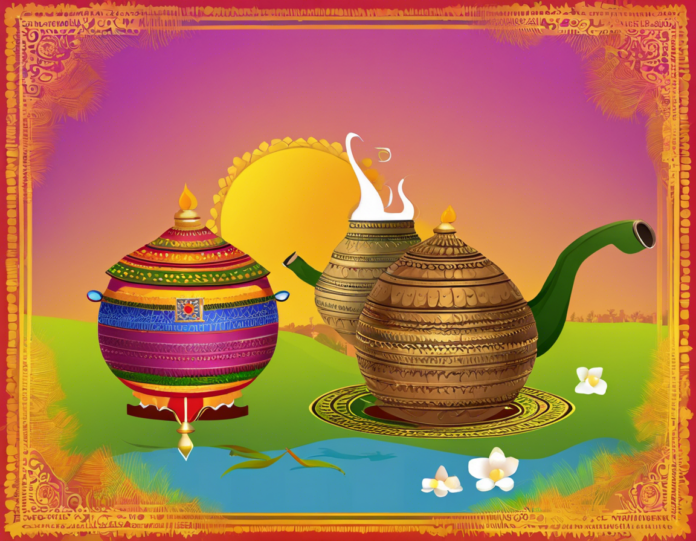Introduction
Pongal is a traditional harvest festival that holds a significant place in the hearts of people in South India, primarily Tamil Nadu. The word “Pongal”” itself signifies boiling over or overflowing, symbolizing abundance and prosperity. Celebrated for four days in mid-January, Pongal is a time of gratitude for the blessings of the harvest season, dedicated to the Sun God, Surya. This festive occasion showcases rich cultural heritage, delicious food, vibrant decorations, and joyous gatherings.
Day 1: Bhogi Pongal
The festivities commence on Bhogi Pongal, marking the beginning of the new year according to the Tamil calendar. This day is about purifying and cleansing the household, getting rid of old belongings, and welcoming new prospects and prosperity. Homes are adorned with kolams – intricate designs made with rice flour, and people burn old belongings in a symbolic fire, signifying renovation and renewal.
Day 2: Thai Pongal
Thai Pongal, the most significant day of the festival, is when Thanksgiving is offered to the Sun God, Surya. Early in the morning, households prepare a special dish called “Pongal”, made of freshly harvested rice, milk, jaggery, and cashews, which is boiled until it overflows. The aroma of Pongal permeates the air, and people shout “Pongalo Pongal” with joy as an offering to the Sun God. This day symbolizes abundance, happiness, and bounty.
Day 3: Mattu Pongal
Mattu Pongal is dedicated to the gratitude shown towards cattle, especially cows, for their contribution to agriculture. Cattle are bathed, decorated, and offered pujas. The famous “Jallikattu” event, where bulls are tamed, is also held, showcasing the courage and skill of the participating individuals. This day highlights the interdependence between humans and animals in farming and agriculture.
Day 4: Kaanum Pongal
The final day of Pongal is known as Kaanum Pongal, which means “viewing” Pongal. Families and friends come together for a day of recreation and relaxation. It is a time for outings, visiting relatives, and sharing meals. People also pray for prosperity and well-being for their loved ones. This day symbolizes the bond of togetherness and the joy of sharing happiness with others.
Traditional Practices
During Pongal, homes are decorated with mango leaves, banana trees, and sugarcanes. Women dress in traditional attire like saris and mekhala chadors, while men wear dhotis and mundus. Rangolis are drawn at the entrance of homes with bright colors, and earthen pots are used to cook the Pongal dish. People engage in dances, music, and cultural programs to celebrate the festival’s spirit.
Culinary Delights
Pongal is incomplete without its culinary delights that tantalize the taste buds. The traditional sweet Pongal made of rice, jaggery, and lentils is a must-have during the festival. Sakkarai Pongal, Ven Pongal, Medhu Vadai, and Payasam are other popular dishes prepared during this time. These delicacies reflect the richness of South Indian cuisine and are shared with family and friends as a symbol of love and unity.
Significance of Pongal
Pongal holds deep cultural significance, emphasizing the importance of agriculture and the rural way of life. It celebrates the farmer’s hard work and dedication, acknowledging their role in sustaining society. The festival also promotes unity and togetherness among communities, fostering a sense of harmony and cooperation. Pongal serves as a reminder of our roots and traditions, connecting us to our ancestral heritage and values.
FAQs (Frequently Asked Questions)
- What is the origin of Pongal festival?
The Pongal festival has ancient origins dating back to Sangam Age in South India. It is believed to have started as a Dravidian harvest festival, honoring nature’s bounty.
- Why is Pongal called the harvest festival?
Pongal is termed as the harvest festival because it celebrates the culmination of the agricultural season and the prosperous yield of crops, especially rice.
- What is the significance of the Pongal dish?
The Pongal dish symbolizes abundance and prosperity. Its boiling over represents the overflowing blessings and bounty in one’s life.
- How is Pongal celebrated in urban areas?
In urban areas, Pongal is celebrated with community gatherings, cultural events, Pongal competitions, and feasts. People also visit temples to offer prayers.
- What are the traditional rituals associated with Pongal?
Traditional rituals of Pongal include decorating homes, drawing kolams, offering prayers to the Sun God, bathing cattle, and engaging in cultural activities.
- Is Pongal only celebrated in Tamil Nadu?
While Pongal is most popular in Tamil Nadu, it is also celebrated in other South Indian states like Andhra Pradesh, Telangana, and Karnataka with variations in customs and traditions.
- Are there any eco-friendly practices associated with Pongal celebration?
Yes, many people opt for eco-friendly celebrations by using leaf plates, organic decorations, and avoiding plastic to minimize environmental impact.
- What is the significance of Jallikattu during Mattu Pongal?
Jallikattu is a traditional bull-taming sport held during Mattu Pongal to showcase the strength and valor of individuals and to honor the bond between humans and cattle.
- How does Pongal festival promote cultural preservation?
Pongal festival promotes cultural preservation by reviving traditional practices, rituals, costumes, and cuisine, passing them down through generations.
-
Can non-South Indians participate in Pongal celebrations?
Yes, Pongal celebrations are inclusive and welcoming to all individuals, regardless of their cultural background. It’s an opportunity to experience and appreciate South Indian traditions.
In conclusion, Pongal is not just a festival; it is a celebration of life, nature, and community. It reminds us of the blessings we have received and the importance of gratitude and togetherness in our lives. By partaking in Pongal festivities, one can experience the rich cultural heritage of South India and embrace the values of harvest, prosperity, and joy that this vibrant festival embodies.
